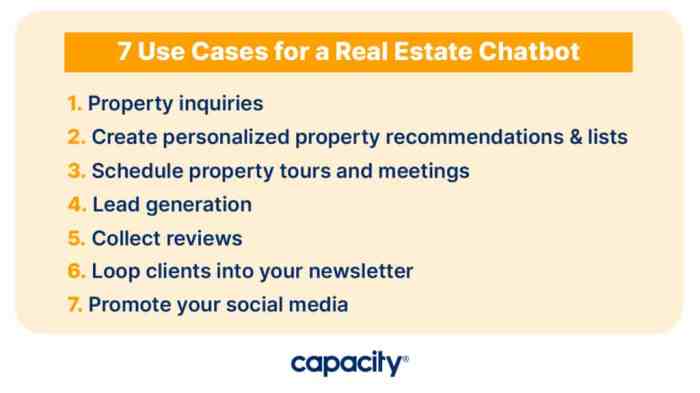real estate chatbot tools sets the stage for this enthralling narrative, offering readers a glimpse into a story that is rich in detail and brimming with originality from the outset. As the real estate industry continues to evolve, the integration of chatbot technology has emerged as a game-changer, enhancing customer engagement and streamlining lead generation. These tools not only facilitate communication between agents and clients but also represent a significant evolution in how real estate transactions are conducted.
Real estate chatbot tools have become essential in today’s market, providing a seamless experience for users while leveraging advanced AI and machine learning technologies. By automating inquiries and offering instant responses, these chatbots help real estate professionals save time and focus on closing deals. The potential for improved client satisfaction and operational efficiency makes the exploration of these tools crucial for anyone in the industry.
Overview of Real Estate Chatbot Tools

Real estate chatbot tools are automated software applications designed to facilitate communication between real estate agents and clients. These tools serve various purposes, including answering inquiries, providing property information, and assisting with scheduling visits. By leveraging chatbot technology, real estate professionals can enhance customer engagement and streamline lead generation processes. Chatbots have significantly evolved over the years, transitioning from basic automated responses to sophisticated AI-driven interactions capable of understanding complex queries and providing tailored solutions.
Key Features of Effective Real Estate Chatbots
Effective real estate chatbots possess several key features that enhance their ability to assist users during transactions. Among these features are:
- 24/7 Availability: Chatbots can operate around the clock, providing immediate responses to inquiries regardless of the time.
- Property Listings: Users can easily access detailed information about available properties, including images, descriptions, and pricing.
- Lead Qualification: Smart chatbots can assess potential clients and prioritize leads based on their inquiries and engagement levels.
These functionalities significantly enhance the user experience, making interactions smoother and more efficient. The integration of AI and machine learning further amplifies chatbot performance, allowing the systems to learn from previous interactions and improve their responses over time.
Benefits of Implementing Chatbot Tools in Real Estate

Implementing chatbot tools in real estate offers numerous advantages to agents and agencies. Key benefits include:
- Time Savings: Chatbots handle routine inquiries, freeing up agents to focus on more complex tasks and personal interactions.
- Resource Efficiency: Automating communication reduces the need for extensive customer service teams, lowering operational costs.
- Enhanced Customer Satisfaction: Quick and accurate responses lead to improved client experiences, fostering loyalty and retention.
The impact of chatbots on customer satisfaction is profound, as they provide timely assistance and consistently meet client expectations.
Best Practices for Designing Real Estate Chatbots
Creating user-friendly chatbot interfaces is essential for successful implementation in real estate. Some best practices include:
- Simplicity: Keep the design clean and intuitive, ensuring users can navigate easily through interactions.
- Personalization: Tailor responses based on user preferences and past interactions to create a more engaging experience.
- Integration: Ensure the chatbot can seamlessly connect with existing real estate platforms, such as CRM systems and property management tools.
Adhering to these guidelines helps create an effective chatbot that enhances user satisfaction and engagement.
Case Studies of Successful Real Estate Chatbot Implementations
Several companies have effectively utilized chatbots to improve their operations. For instance, a leading real estate agency implemented a chatbot that significantly reduced response times, leading to a 30% increase in client engagement. Another firm reported that their chatbot successfully handled over 60% of initial inquiries without human intervention, allowing agents to focus on closing deals.
Measurable outcomes from these implementations include higher conversion rates and improved customer satisfaction scores, showcasing the effectiveness of chatbots in the real estate sector.
Challenges and Limitations of Real Estate Chatbots
Despite their advantages, deploying chatbots in real estate comes with challenges. Common issues include:
- Understanding Complex Queries: Current chatbot technology may struggle with nuanced questions that require in-depth knowledge or context.
- Integration Difficulties: Some real estate platforms may have compatibility issues with chatbot systems, complicating deployment.
- Legal and Ethical Concerns: There are potential legal implications regarding data privacy and how chatbots handle sensitive client information.
These limitations highlight the need for continuous improvement and careful implementation of chatbot solutions.
Future Trends in Real Estate Chatbot Technology
Emerging trends in chatbot development suggest a promising future for real estate applications. Key advancements include:
- Enhanced AI Capabilities: Future chatbots are expected to integrate more advanced AI, improving their ability to understand and respond to complex queries.
- Voice Interaction: The inclusion of voice recognition technology will allow users to interact with chatbots more naturally and intuitively.
- Augmented Reality Integration: Integrating AR features may enable users to visualize properties through chatbots, enhancing the decision-making process.
These trends indicate the potential for significant improvements in chatbot functionality and user experience.
How to Choose the Right Chatbot Tool for Real Estate, Real estate chatbot tools
Selecting the appropriate chatbot tool is critical for achieving desired outcomes. Factors to consider include:
- Functionality: Assess the features offered by different chatbot tools and how they align with business needs.
- Scalability: Choose a solution that can grow with the business, accommodating increasing volumes of inquiries.
- Cost: Evaluate pricing structures to ensure that the chosen chatbot provides value without straining the budget.
A comprehensive comparison of popular chatbot tools can provide further insight into their respective strengths and weaknesses, aiding in the decision-making process.
Final Thoughts

In conclusion, the future of real estate chatbot tools is bright, with ongoing advancements promising to further enhance their capabilities. As we’ve explored, the benefits of implementing these technologies are manifold, from increased customer satisfaction to improved operational efficiency. By understanding the challenges and embracing best practices, real estate professionals can effectively harness these tools, paving the way for greater success in an ever-competitive market.
